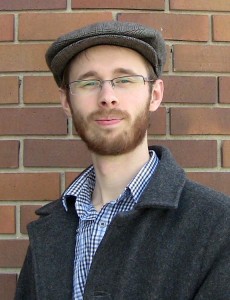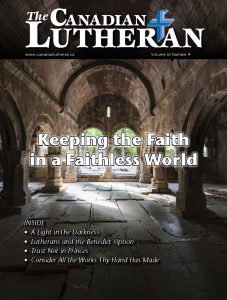A Light in the Darkness
By: Mathew Block
There is prepared on high My heritage, my lot;
Though here on earth I sink and die, My heaven shall fail me not.
Though here my days are dark, And oft my tears must rain,
Whene’er my Saviour’s Light I mark, Lo, all is bright again.
 So wrote Paul Gerhardt , that great luminary among Lutheran hymnwriters, in 1650 (the translation is Catherine Winkworth’s). Like so many of those hymns penned by Gerhardt, the words here are a comfort to those facing dark days, whether in their personal lives or when they look to the state of the world around them. In the midst of our many griefs, we can find comfort knowing Christ has prepared a place for us in the life to come—that he will lead us in the fullness of time through the shadows and into the light of His eternal kingdom.
So wrote Paul Gerhardt , that great luminary among Lutheran hymnwriters, in 1650 (the translation is Catherine Winkworth’s). Like so many of those hymns penned by Gerhardt, the words here are a comfort to those facing dark days, whether in their personal lives or when they look to the state of the world around them. In the midst of our many griefs, we can find comfort knowing Christ has prepared a place for us in the life to come—that he will lead us in the fullness of time through the shadows and into the light of His eternal kingdom.
Gerhardt knew a thing or two about facing sorrow. He lived through the Thirty Years’ War, a long, devastating conflict that waged from 1618-1648. The war was responsible for the deaths of perhaps eight million people in Central Europe. Some died through actual armed warfare; many others died from famine and disease, which ran rampant as a result of the three-decade conflict. Anywhere from 25 to 40 percent of the entire population of the German states was wiped out. Dark days indeed.
We find ourselves in the midst of dark days in Canada too. We do not face armed warfare (thank God), but we are nevertheless in the midst of a spiritual battle. Canada—and western society at large—has long been in a struggle to determine what place, if any, the Church should have in guiding wider culture, politics, and morality.
Then again, perhaps it would be more honest to say Canada was once in such a struggle. Let’s not muddy the issue: our nation has already secularized. That battle has been lost. Indeed, Christians in Canada are increasingly vilified and ostracized in wider society. One need only look at the recent Supreme Court decision on Trinity Western University for evidence of this fact. This Christian university was trying to open a Law School, but several provincial law societies refused graduates of TWU to practice in their province. The issue was taken to the Supreme Court of Canada. There eight of nine judges agreed the law societies’ actions infringed upon TWU’s religious freedom; and yet the court declared such discrimination legal anyway.
The Church in Canada finds itself in exile; how then should we respond?
The days are indeed evil, as St. Paul writes (Ephesians 5:16). So how then are we as Christians to make the best use of the time (Ephesians 5:16)? The Church in Canada finds itself in exile; how then should we respond?
We should begin where the Church must always begin: in the Scriptures. In particular, Jesus’ teaching that we are in the world but not of it is all the more important for us to remember (cf. John 17:14-16). Though exiled, Christians must not withdraw from the world; we are “in it,” after all. But we are also to be on our guard so that we do not become “of the world” either.
In his article on The Benedict Option this issue, Rev. Esko Murto outlines for us how Christians can begin fortifying their faith right now, by recommitting themselves to prayer and the study of Scripture, to gather with other Christians to receive Word and Sacrament, to living as if faith in Christ really is the most important thing in their lives. He calls us, in other words, to remember what it means to be “not of this world.”
 Rev. Dr. John Hellwege meanwhile reminds us of the privileges and responsibilities we enjoy as people who are “in the world.” He outlines for us both the dangers and God-given opportunities which lie in our engagement with the political realm. For God is still God over the civil realm too. We should engage that system insofar as we can do so in good conscience, working to safeguard the diminishing rights the Church currently enjoys.
Rev. Dr. John Hellwege meanwhile reminds us of the privileges and responsibilities we enjoy as people who are “in the world.” He outlines for us both the dangers and God-given opportunities which lie in our engagement with the political realm. For God is still God over the civil realm too. We should engage that system insofar as we can do so in good conscience, working to safeguard the diminishing rights the Church currently enjoys.
We should not be deceived into thinking we will, through political means, somehow save the world though. That’s Jesus’ job, not ours. Instead, we are called to be faithful with the resources and time which we have been given, however little they may be (Matthew 25:14-30). That means intentionally seeking to grow in our faith through regular prayer, attendance at worship, and Scripture reading. It means making your home a place where Christ comes first—before entertainment, before sports, before that extra hour of sleep on a Sunday morning. It means teaching the faith intentionally to your children—to spend time in family devotions, to study the catechism together, to sing hymns. It means cultivating relationships with family, friends, and neighbours, and intentionally sharing the Good News of Christ with them.
The days are indeed dark. But thanks be to God, Christ is the Light of the world (John 8:12)! In His light, we see light (Psalm 36:9), and with His Word to guide us, we may yet navigate this benighted world (Psalm 119:105). We even become mirrors, reflecting His light to those still dwelling in darkness (Matthew 5:16).
It’s my privilege to walk that road with you again, as with this issue I return as editor of The Canadian Lutheran. I pray that God would continue to use this little magazine to show you just how bright His light is—and how bright a light you can be too in the dark little corner of the world where you find yourself now.
Mathew Block is editor of The Canadian Lutheran magazine and communications manager for the International Lutheran Council.





